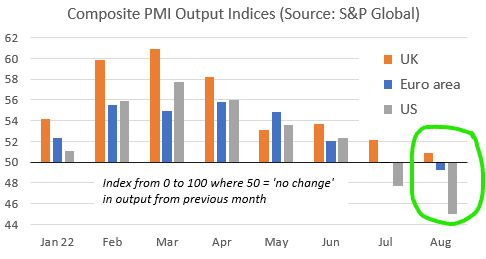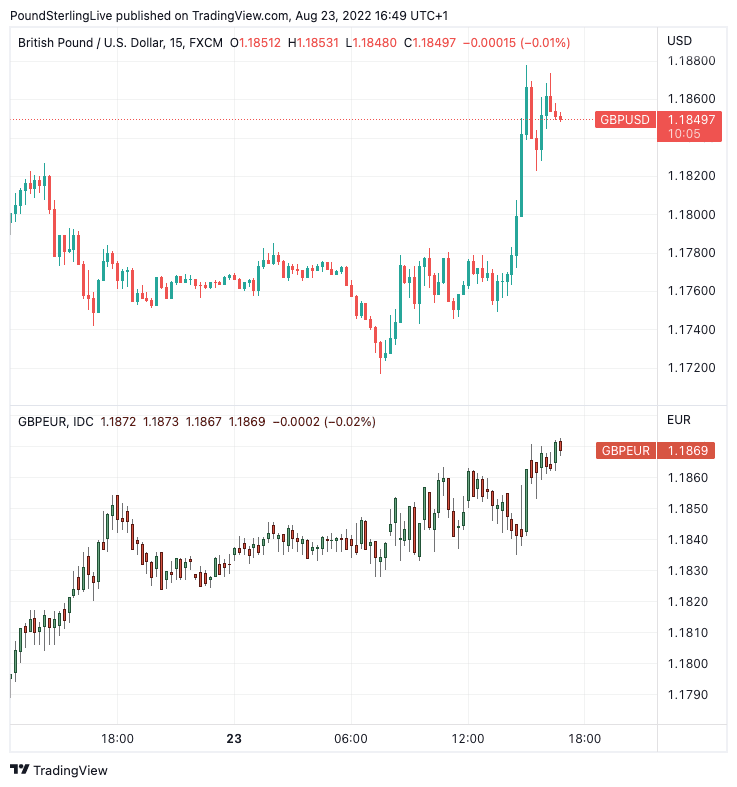How Truss Can Save Pound Sterling from a "Winter of Woe"
- Written by: Gary Howes
- GBP catches a break
- As UK PMIs eclipse Eurozone and U.S. versions
- But "winter of woe" looms for GBP
- However, newcomer Truss could fix it
- As expectations for emergency budget grow

Image © Gov.uk, picture by Tim Hammond / No 10 Downing Street.
The British Pound has recovered some ground against the Dollar and remains supported against the Euro midweek, however the prospect of a marked economic slowdown over coming months amidst surging inflation could keep it on the defensive unless the next Prime Minister delivers a bold package of action.
The Pound rose against the Dollar and Euro Tuesday after UK PMI data showed the UK economy continued to expand in August, meanwhile similar surveys out of the Eurozone and U.S. showed contraction.
This relative outperformance presented a rare bit of good news for the British Pound, which is one of the laggards in the G10 of major currencies for 2022.
"Flash composite PMIs for August continue to show the UK economy weathering the global crisis better than the euro area (where the recession alarms are already ringing)," says independent economist Julian Jessop. "The UK is now one of the few major economies still posting positive numbers, but global weakness adds to recession risks here too".
The Pound to Euro exchange rate recovered to 1.1871 from a low of 1.1830 following the data, taking bank rates on euro payments to 1.1630 and rates at independent specialist providers towards 1.1840.
The Pound to Dollar exchange rate recovered to 1.1870, taking bank account quotes for dollar payments towards 1.1634 and those at independent providers to around 1.1830.
Above: The UK economy outperformed in August, according to the PMI series. Image courtesy of @julianHjessop
Although the UK PMIs beat expectations the outlook remains challenging with firms saying orders were down and confidence amongst customers weak, with blame being placed at the door of the UK's inflation rate which is only likely to peak in October.
This combination of high inflation and weak growth is of little support to a currency's longer-term prospects.
"We remain bearish GBP on grounds of stagflation, despite already bearish positioning," says a weekly currency market strategy note from Barclays.
Citi, one of the world's largest banks, caused a stir this week when it forecast UK CPI inflation will hit 18.6% in January.
It expects the energy price cap to rise to £3,717 in October, then to £4,567 in January and £5,816 in April.
"Inflation at 18.6% would push millions of people into dire straits. And because these horrible price hikes are being driven by the essentials people need to stay alive – like food and heat – it's going to hit those on lower incomes hardest, who've got nothing left to give," says Sarah Coles, senior personal finance analyst at Hargreaves Lansdown.
"A winter of woe is looming amid these frightening forecasts and there is little help in sight to stop a spiral of debt as Shocktober approaches," adds Coles.
Compare Currency Exchange Rates
Find out how much you could save on your international transfer
Estimated saving compared to high street banks:
£2,500.00
Free • No obligation • Takes 2 minutes
However, the Citi forecast largely assumes fiscal policy from the UK government remains relatively unchanged.
This is unlikely to be the case as Liz Truss, the favourite to win the Conservative leadership race, is set to deliver an emergency budget early in her tenure.
Extraordinary measures to deal with the cost of living crisis are expected, and this could make a significant dent on both realised inflation levels and broader consumer and business confidence.
"We can still cling to the hope that there will be more help on offer," says Coles.
Bloomberg reports Truss is preparing to fast-track an emergency spending package to help people cope with surging energy costs.
The report says Truss could announce the measures before Parliament rises on September 22 for a recess when political parties hold their annual conferences.
Truss is apparently "eager to act as soon as possible" on energy bills.
Above: GBP/USD and GBP/EUR at 15 minute intervals showing Sterling's recovery on Tuesday.
The scale of the intervention won't be trivial as the same report says Truss government intends to bypass the usual oversight of any new plans that would stem from the Office for Budget Responsibility (OBR).
The OBR typically runs through the government's plans ahead of any budget, to provide the necessary independent context and debt forecasts. The FT confirms this is indeed Truss' intention, saying she was unwilling to wait the usual 10-week period for the OBR to conduct its forecasts.
By bypassing the OBR Truss would be taking a page from the strategy of former Chancellor Rishi Sunak when setting out aid during the pandemic.
Sunak's response to the pandemic was monumental and Truss will have to deliver something of equal measure to shore up the economy as it faces its next great headwind.
But the figures required to protect households will be truly astronomical.
Keith Anderson, Chief Executive of Scottish Power, one of the 'Big Six' energy suppliers, told ministers that a rescue plan to protect households from rising bills will need funding of more than £100BN over two years.
This would cap bills at about £2K a year.
For the Pound, anything that can nip the inflation surge and restore consumer confidence would be supportive and could ultimately preserve it from any major losses over coming weeks and months.
However, the cost will be huge and risks bloating the UK's debt burden to the extent international investors are less willing to invest in Sterling assets.
Compare Currency Exchange Rates
Find out how much you could save on your international transfer
Estimated saving compared to high street banks:
£2,500.00
Free • No obligation • Takes 2 minutes






